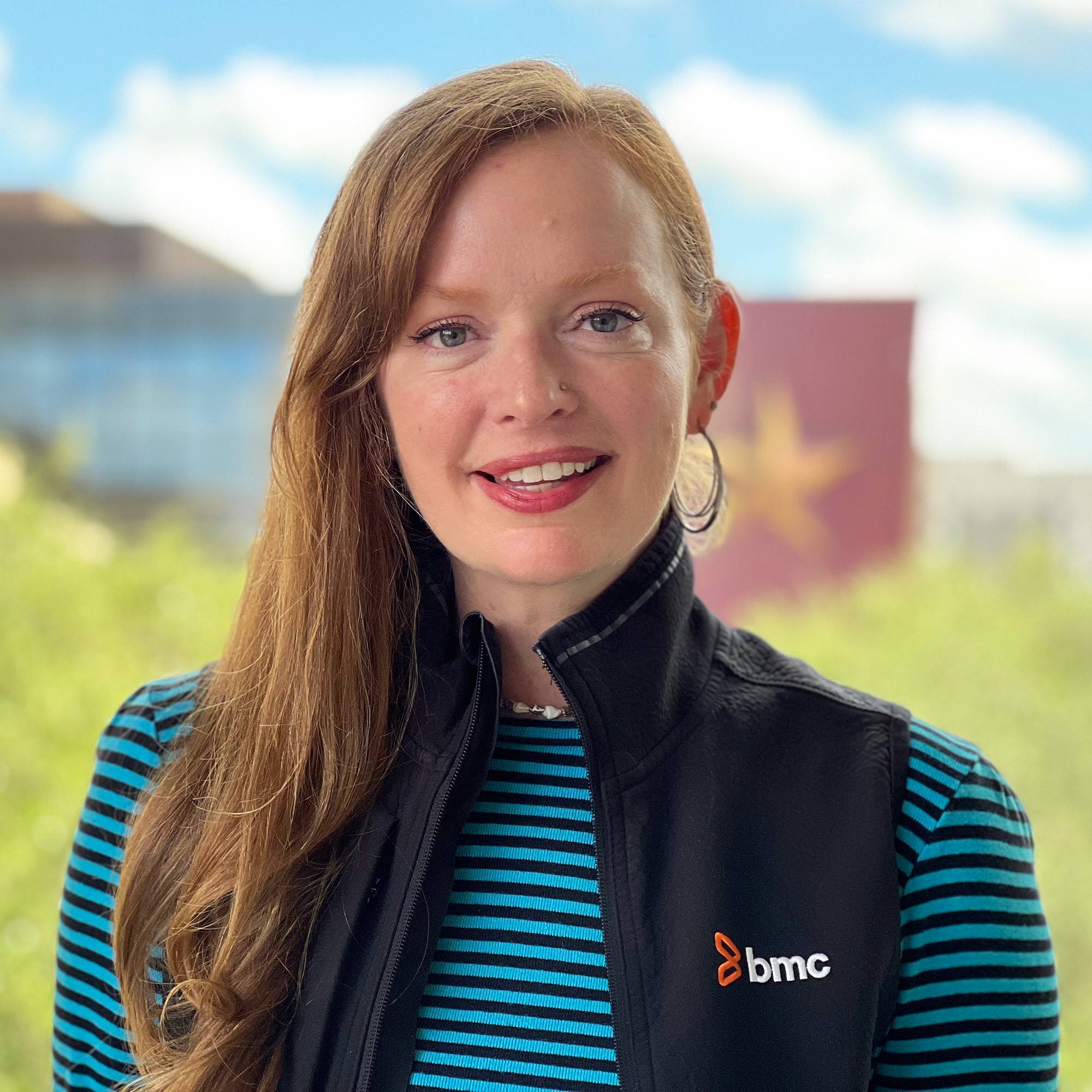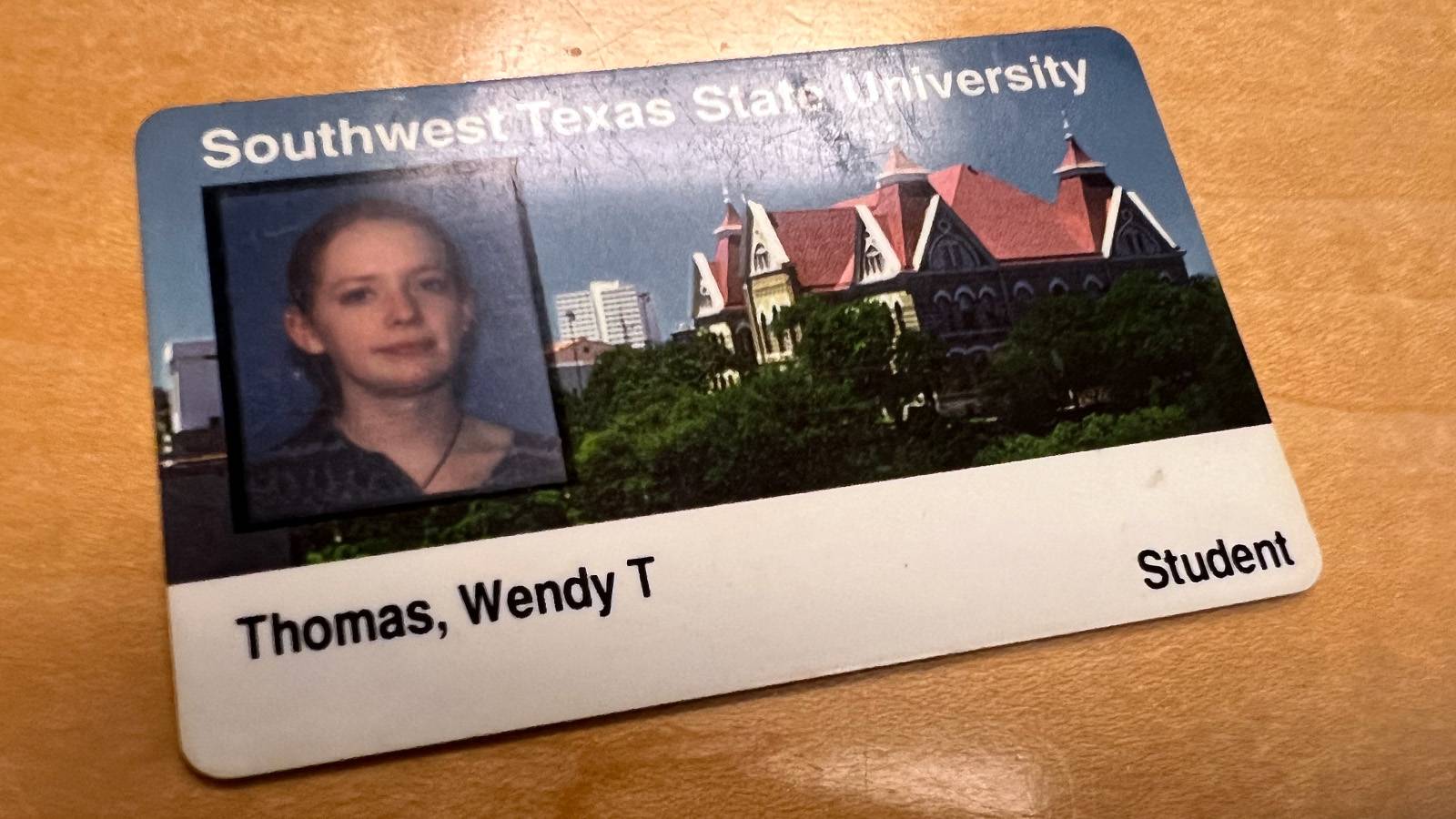TXSTMcCOY MAGAZINE

From 6th
Street
to the
C-Suite
Wendy Rentschler shares her journey from late-night shifts in college to life-changing solutions at the U.N.
by Valerie Figueroa
"I am sure that I was a dolphin in a past life," jokes BBA management alumna Wendy Rentschler, providing a glimpse into her personal life that echoes her commitment to corporate social responsibility and environmental advocacy.
Rentschler grew up in the Galveston area during a time when environmental pollution was part of everyday life. Even as a child, she recognized its impact and found inspiration in the ecological campaigns and children's programs of the 1990s advocating for conservation. Those early influences, combined with firsthand experience of financial hardship, sparked an interest in the intersection of business and corporate social responsibility.
"I knew it was probably not good for me to swim in water with plastic bags, so it was common sense to me that we should take care of the spaces that we live in," she says. "I also had a very challenging upbringing. I was a beneficiary of a lot of the programs that I advocate for today, whether that's human rights, gender representation, clean water, clean air, reducing food insecurity, or access to education."
Wendy Rentschler was not a traditional college student. Her road to the C-suite was fraught with financial hardships, yet the pursuit of her dream to escape her situation persisted. From starting her first paying job at 11 to living in her car and traveling the country, she eventually settled in Austin, working late-night bartending shifts on 6th Street to pay for college tuition and attending evening classes at Texas State University’s Round Rock and San Marcos campuses. Rentschler's success did not come easily.
"I paid for college in cash," she says, recalling her journey through late shifts, multiple community colleges, and the decision to go to business school. “Thank you to everyone who came to 6th Street — to all the bars where I worked, and especially to those who tipped,” she says with a laugh. “I didn’t have a very traditional college experience, as you can imagine. I didn’t have a high GPA — but I did finish.”
Her motivation to finish college?
"I needed to eat and have a place to sleep," she says. "Growing up, you were told if you wanted to transcend and get out of poverty, you had to go to college. While education remains incredibly valuable, today there are many ways to build a successful and fulfilling career,” she says.
Now the Global Head of Corporate Citizenship, ESG and Impact at BMC Software Rentschler leads with the ethos that corporate citizenship is a business strategy, not a side project.
In a management course she took in college, she found a pivotal piece of text that “really stuck” and would ultimately guide her through her career.
"There was a tiny blurb in a book. About the triple bottom line, people, planet, profit, and how you can do business, but also do good for the world, and those are not antithetical to one another."
Rentschler was also recently named a Top 20 Chief Sustainability Officer in North America by Futur/io at the 2025 North America CSO Awards. In collaboration with Imperial College London Business School, nominees are selected through an extensive review process of a vast database of Fortune 2000 enterprises, focusing on CSOs and organizations setting the benchmark in the race to achieve NetZero initiatives by 2040.
"I thought to myself, 'Okay, this is something where the work that I am doing with my partners was really making an impact,'" she says. "I was really excited about it. This work is not easy, and we don't get a lot of wins right now, but it is nice to be able to spend time with people who have the same desires that you do, to live in a world where the air is cleaner, the water is cleaner, and we can survive a little bit longer here."
Today, her career portfolio at BMC spans enterprise-wide and global initiatives across sales and client engagement, equitable people programs, sustainability, ethical AI advocacy, responsible procurement, governance, public affairs, and policy — all unified through an ESG framework that connects business strategy with social and environmental impact across the company’s international ecosystem and client network.
BMC’s goal is to become a net-zero value chain enterprise by 2030. In today’s interconnected global economy, organizations that want to operate successfully across borders must embed strong ESG principles into every aspect of their business. At BMC, this means aligning sustainability, ethics, and accountability across operations — from supplier relationships and governance practices to client engagement and technology development.
“Emissions and ethics travel the supply chain — and so must accountability,” Rentschler says. “Companies want to do business with organizations that reflect their values, and in an international marketplace, that value is climate action.”
Operating within a complex global system also requires recognizing that perspectives on climate action can vary across regions and cultures. Rentschler focuses on building sustainability programs that transcend political or geographical boundaries by emphasizing universal values such as clean water and healthy land.
“I always say, no matter what your political affiliation is, everyone loves dolphins and trees.”
Rentschler is candid about AI’s potential — and its risks. As a former recruiter, she recognized early on that AI-driven hiring tools can unintentionally amplify bias when they rely on data patterns that reflect systemic inequities rather than true capability. She warns that without intentional oversight, technology can “hyper-scale discrimination” at a pace never seen before. Her approach to mitigating these risks is to raise the hygiene bar for AI systems — containerizing models, implementing stronger regulations, and educating developers and vendors to ensure responsible design and deployment.
Rentschler also points out that AI’s growing energy demand presents both a challenge and an opportunity for transition. She has written about the potential for generative AI to serve as a catalyst for a renewable energy future — a concept that underscores the importance of aligning technological progress with sustainable power innovation. It’s a connection she continues to emphasize — particularly in regions where sustainable power generation is already strong.
“Many people don’t realize wind energy is one of our largest industries,” she emphasizes. “As the energy capital of the world, Texas has an incredible opportunity to lead — not just nationally, but internationally. If we stay focused and pragmatic about what energy means to us, invest in sustainable solutions, and align that progress with the AI journey, we can ensure both innovation and responsibility move forward together.”
A focus on ethical, sustainable business practices is at the core of Rentschler’s philosophy and extends to her work with the United Nations. She was invited by the UN Global Compact to represent the private sector and the technology industry at the UN Office on Drugs and Crime Multi-Stakeholder Hearing on the Global Plan of Action to Combat Trafficking in Persons. Known for offering practical, results-oriented solutions that turn ideas into action, Rentschler used her platform to focus on what can be done in real terms. In the three minutes allotted, she delivered clear, attainable steps to help combat human trafficking.
“I’m a solutioner — I want to provide solutions,” she says.
Her suggestions: Require satellite makers with government contracts to thoroughly vet buyers and develop registries, collaborate with corporations and local businesses to share anti-trafficking information in communities, and partner with telecommunication companies to provide accessible education platforms.
“I think it was Samsung when they released one of their phones,” she recalls. “Those phones included the UN Sustainable Development Goals as an app where users could learn about the SDGs. It might seem like a small detail, but raising awareness through everyday technology can help people better understand issues like human trafficking and inspire action at scale.”

“I was a beneficiary of a lot of the programs that I advocate for today, whether that's human rights, gender representation, clean water, clean air, reducing food insecurity, or access to education.”
— Wendy Rentschler
Despite her position as a C-suite-level executive who works at the enterprise scale, she has not lost sight of her roots. Her altruism extends to her alma mater, where, in collaboration with the McCoy College Foundation, she has established the Wendy Rentschler Scholarship for First-Gen Business Leaders Endowment. The $25,000 scholarship will be fully endowed by April 30, 2026, and once established, will provide annual awards to first-generation undergraduate students from the McCoy College of Business who meet the criteria. For Rentschler, it’s a way to pay forward the opportunities that helped shape her own journey — and to ensure that access and possibility remain within reach for the next generation of leaders.
"I definitely love that Texas State has very much focused on the first-generation crowd," she says proudly. "I want to make it as easy as possible for as many people who want to go to college to be able to go to college," she says.
Rentschler’s commitment to access and opportunity extends beyond the corporate world into entrepreneurship. Through her work with The IndUS Entrepreneurs (TiE) — the world’s largest entrepreneur network — she mentors and invests in early-stage founders, helping them navigate the challenges of building sustainable businesses. As a board member of TiE’s Houston chapter, she is deeply involved in fostering innovation and creating pathways for underrepresented entrepreneurs to succeed. She believes the greatest barrier for many aspiring founders isn’t a lack of ideas — it’s a lack of awareness about the resources, networks, and funding opportunities available to help them grow.
“I really wish there was more visibility around these programs because so many entrepreneurs don’t know they exist,” she says. Reflecting on a lesson she learned later in life — one that many people with means are taught early — she references Rich Dad, Poor Dad: “Poor people work for their money, and rich people make their money work for them.” For Rentschler, spreading that kind of financial awareness is as vital as mentorship itself — because access to knowledge is often the first step toward access to opportunity.
Corporate citizenship is here to stay, Rentschler says. ESG is a core principle of any business in today's market, influencing everything from customer engagement to employee retention strategies, particularly for international companies.
“If you sell or buy anything — which is every single business — and you operate internationally, corporate citizenship is essential to your overall strategy,” she says. “It’s part of everything we do. The United States makes up only about 4% of the global population, which means 96% of consumerism happens outside of this country. I don’t know any business that’s only trying to sell to 4% of the world.”
When she's not working, the Galveston resident says she recharges in the waters of the gulf with her family. She stays busy managing a network of short-term rentals with her childhood friend, saying the hands-on hospitality keeps her grounded.
"Yes, maybe when you rent an Airbnb, a tech executive might have scrubbed your toilet," she chortles.
During her downtime, she enjoys listening to various podcasts, including Freakanomics and NPR’s Planet Money. She is also an avid reader and offers a curated list of titles with a reminder to shop for them at local bookstores. "
A lot of my book recommendations will be on economics and leadership," she shares.
Rentschler’s rise from Austin’s 6th Street to the global C-suite reflects a Texas State story built on access, resilience, and a defining principle: people, planet, and profit are not trade-offs — they’re the future of business. ✯
Valerie Figueroa is the communications specialist at the McCoy College of Business. Valerie earned a B.S. in mass communication and an M.A. in mass communication at Texas State University.